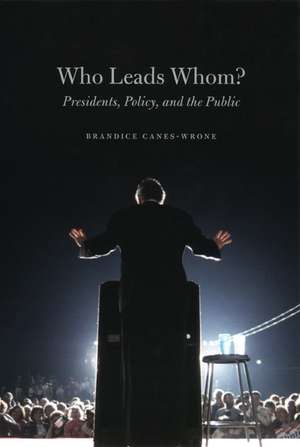Who Leads Whom?: Presidents, Policy, and the Public: Studies in Communication, Media, and Public Opinion
Autor Brandice Canes-Wroneen Limba Engleză Hardback – 19 ian 2006
Who Leads Whom? is an ambitious study that addresses some of the most important questions in contemporary American politics: Do presidents pander to public opinion by backing popular policy measures that they believe would actually harm the country? Why do presidents "go public" with policy appeals? And do those appeals affect legislative outcomes?
Analyzing the actions of modern presidents ranging from Eisenhower to Clinton, Brandice Canes-Wrone demonstrates that presidents' involvement of the mass public, by putting pressure on Congress, shifts policy in the direction of majority opinion. More important, she also shows that presidents rarely cater to the mass citizenry unless they already agree with the public's preferred course of action. With contemporary politics so connected to the pulse of the American people, Who Leads Whom? offers much-needed insight into how public opinion actually works in our democratic process. Integrating perspectives from presidential studies, legislative politics, public opinion, and rational choice theory, this theoretical and empirical inquiry will appeal to a wide range of scholars of American political processes.
Analyzing the actions of modern presidents ranging from Eisenhower to Clinton, Brandice Canes-Wrone demonstrates that presidents' involvement of the mass public, by putting pressure on Congress, shifts policy in the direction of majority opinion. More important, she also shows that presidents rarely cater to the mass citizenry unless they already agree with the public's preferred course of action. With contemporary politics so connected to the pulse of the American people, Who Leads Whom? offers much-needed insight into how public opinion actually works in our democratic process. Integrating perspectives from presidential studies, legislative politics, public opinion, and rational choice theory, this theoretical and empirical inquiry will appeal to a wide range of scholars of American political processes.
Din seria Studies in Communication, Media, and Public Opinion
-
 Preț: 246.71 lei
Preț: 246.71 lei -
 Preț: 138.45 lei
Preț: 138.45 lei -
 Preț: 260.09 lei
Preț: 260.09 lei -
 Preț: 254.81 lei
Preț: 254.81 lei -
 Preț: 223.85 lei
Preț: 223.85 lei -
 Preț: 281.96 lei
Preț: 281.96 lei -
 Preț: 226.57 lei
Preț: 226.57 lei -
 Preț: 190.49 lei
Preț: 190.49 lei -
 Preț: 251.44 lei
Preț: 251.44 lei -
 Preț: 280.84 lei
Preț: 280.84 lei -
 Preț: 361.79 lei
Preț: 361.79 lei -
 Preț: 258.24 lei
Preț: 258.24 lei -
 Preț: 220.14 lei
Preț: 220.14 lei -
 Preț: 237.41 lei
Preț: 237.41 lei -
 Preț: 250.70 lei
Preț: 250.70 lei -
 Preț: 232.38 lei
Preț: 232.38 lei - 13%
 Preț: 200.91 lei
Preț: 200.91 lei
Preț: 475.39 lei
Preț vechi: 612.72 lei
-22% Nou
Puncte Express: 713
Preț estimativ în valută:
90.99€ • 94.83$ • 75.74£
90.99€ • 94.83$ • 75.74£
Carte indisponibilă temporar
Doresc să fiu notificat când acest titlu va fi disponibil:
Se trimite...
Preluare comenzi: 021 569.72.76
Specificații
ISBN-13: 9780226092805
ISBN-10: 0226092801
Pagini: 192
Ilustrații: 7 line drawings, 14 tables
Dimensiuni: 152 x 229 x 18 mm
Greutate: 0.44 kg
Editura: University of Chicago Press
Colecția University of Chicago Press
Seria Studies in Communication, Media, and Public Opinion
ISBN-10: 0226092801
Pagini: 192
Ilustrații: 7 line drawings, 14 tables
Dimensiuni: 152 x 229 x 18 mm
Greutate: 0.44 kg
Editura: University of Chicago Press
Colecția University of Chicago Press
Seria Studies in Communication, Media, and Public Opinion
Notă biografică
Brandice Canes-Wrone is associate professor of politics and public affairs at Princeton University.
Cuprins
List of Tables and Figures
Preface
Acknowledgments
1. Presidents' Involvement of the Mass Public1
Part One - Public Appeals
2. A Theory of Public Appeals
3. Domestic Policy Appeals
4. Foreign Policy Appeals
Part Two - Policy Pandering and Leadership
5. Incentives for Policy Pandering
6. Examples of Policy Pandering and Leadership
7. Patterns of Presidential Decisions
With Kenneth W. Shotts
8. Chief Executives, Policymaking, and the Public
References
Index
Preface
Acknowledgments
1. Presidents' Involvement of the Mass Public1
Part One - Public Appeals
2. A Theory of Public Appeals
3. Domestic Policy Appeals
4. Foreign Policy Appeals
Part Two - Policy Pandering and Leadership
5. Incentives for Policy Pandering
6. Examples of Policy Pandering and Leadership
7. Patterns of Presidential Decisions
With Kenneth W. Shotts
8. Chief Executives, Policymaking, and the Public
References
Index
Recenzii
“There is a need for such a book that sharpens our thinking and examines the big questions about leadership, responsiveness, and democracy. Indeed, this is a very ambitious book that succeeds in defining, theorizing about, and rigorously examining presidential pandering as well as substantially advancing political thinking and research.”--Robert Shapiro, Columbia University
“In the remarkably readable Who Leads Whom? Brandice Canes-Wrone not only integrates and extends innovative formal theories of the president, the Congress, and the public but also subjects these and competing theories to uniquely discriminating empirical tests. Scholars who pine for a new state of the art in presidential research should take note. This is it.”
“Brandice Canes-Wrone raises interesting and important new questions about the public presidency and systematically tests her theorizing. A must-read for presidency scholars.”--George C. Edwards III, editor of Presidential Studies Quarterly
"The book's findings are interesting and help us to better understand both the relationship between presidents and the public, as well as the nature of presidential rhetoric."
"By explicitly considering how policy is made, Canes-Wrone substantially advances our understanding of when presidents will go public and how these appeals influence policy. Most important, she suggests that public opinion infiuences pohcymaking, but presidents neither manipulate public opinion nor follow it regardless of where it goes. Rather, in some sense, presidents act as agenda setters by playing a role in determining which policies the public will see as salient and Congress will ultimately act on."
